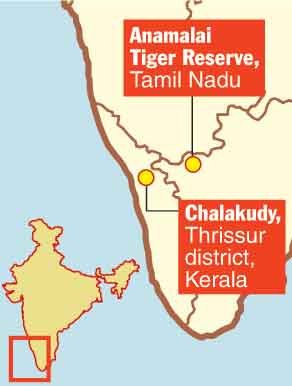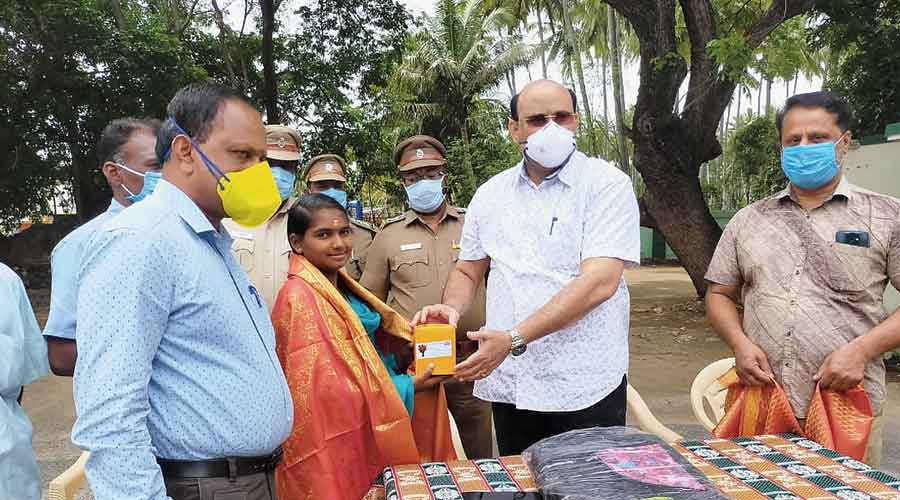When 16-year-old C. Sreedevi left her home at the Poochukottamparai tribal settlement, set deep inside the Anamalai Tiger Reserve in Tamil Nadu, around 2am on May 27 with her father Chellamuthu, it wasn’t just dense forests she had to negotiate.
Ahead of her lay also a thicket of thorny challenges and gigantic odds.
Amid an epidemic-induced lockdown, she had to travel 157km to Kerala to sit her board exams, for which she had to prepare without the help of electricity, Internet or even mobile connectivity in her part of the world.
The same handicaps that had also ensured that she learnt about her exam date just two days in advance.
In the pre-dawn darkness of May 27, Sreedevi had no time to think about it, though, as father and daughter trekked more than 6km through difficult forest terrain to reach the nearest drivable road.
Chellamuthu then climbed onto his motorbike — which he parks at a friend’s house as his settlement has no roads — and ferried Sreedevi along 70km of bumpy country roads to Malakkappara, a border town between Valparai in Tamil Nadu and Chalakudy in Thrissur district in Kerala.
At Malakkappara, a Kerala government ambulance was waiting for Sreedevi. After father and daughter said goodbye, it took Sreedevi another 81km to the Government Model Residential School for Tribals at Nayarangadi near Chalakudy.
This was the school where Sreedevi was enrolled and which she had had to leave two months earlier because of the epidemic and the lockdown. And this was where she would now take her rescheduled Secondary School Leaving Certificate (SSLC) examination.
Three of her exams had been held in March before the coronavirus struck. Unlike most school boards, Kerala’s had taken up the challenge of conducting the rest of the exams during the lockdown, allowing 4.22 lakh students from aided and government schools to appear in 2,945 centres amid stringent safety measures.

The teen had to travel 157km to Kerala to sit her board exams The Telegraph
As Sreedevi’s travel involved crossing the Kerala-Tamil Nadu border, she had to undergo mandatory quarantine. An “isolation exam hall” was arranged for her, and she stayed at the hostel under quarantine norms through the eight-day exams.
She left for home on the ninth day — following the same sequence of ambulance and motorbike rides and foot journey — before spending another 14 days in home quarantine. Inside the forest, it’s a virtual quarantine, anyway.
An exhausting nine days? No problem, really, for a sturdy girl who has represented Kerala at the national championships of atya patya — a traditional game — three times in the past three years.
When the results were announced hardly a month after the exam, Sreedevi had scored an A-Plus in every subject and secured 95 per cent overall.
She is the only one from Poochukottamparai — and the first from the forest-dwelling Muduvar tribal community — to have cleared her school finals.
It took Sreedevi five days to learn her results, though.
The teachers from her school had informed one of her relatives at Malakkappara but he had no way of communicating with Poochukottamparai. After trying unsuccessfully to find a messenger for four days, the relative rode a bike to Sreedevi’s village on the fifth.

Officials of Anamalai Tiger Reserve felicitate Sreedevi at Udumalpet in Tamil Nadu on July 8 Sourced by the correspondent
Yet it had been touch and go. When the Kerala government decided to conduct the remaining exams, the school had faced a problem: how to inform Sreedevi.
Eventually, the school contacted Kerala forest officials, who got in touch with their Tamil Nadu counterparts, who sent forest guards to Sreedevi with the message from her teachers Sharika Saleesh and Sini Thomas.
The message said the school would arrange an ambulance for Sreedevi from Malakkappara, provided she could reach the town on her own steam.
However, only two days were left before the exams. And her father was away from home, collecting honey in the forests’ interiors.
Fortunately, Chellamuthu returned home late on the evening of May 26. Immediately, the preparations to reach the exam centre the next morning began.
“I never thought I could score 95 per cent. Most of our community members drop out after elementary or middle school. I want to be a doctor,” Sreedevi told this correspondent over the phone.
Most of the tribal children in Sreedevi’s village study at a single-teacher primary school inside the forest. After Class IV, they face the choice of going to a residential school or dropping out.
Like Sreedevi’s elder brother, most choose to drop out.
Sreedevi told this correspondent she wished to study science at the same residential school and that the forest officials had requested the school to reserve a seat for her. The Tamil Nadu forest department has decided to meet all her education expenses.
On July 8, when the forest department feted Sreedevi at Udumalpet near Tirupur, she asked for a laptop and was promised one by Arockiaraj Xavier, deputy field director at the Anamalai Tiger Reserve.
“Sreedevi comes from an isolated tribal settlement that lacks roads, electricity or access to telephones. The family lacks a proper house,” said P. Shanmugham of the Tamil Nadu Tribal Welfare Association, an NGO.
Sreedevi lives in a rundown tiled-roof house given by the government.
“It was Chellamuthu’s resolve to enrol her at the residential school at Nayarangadi that made all the difference,” Shanmugham said.
“The children of forest-dwelling tribal communities need more tribal residential schools. The model residential schools in Kerala are a model for others to emulate. I’m deeply moved by the commitment of the teachers at the school who arranged the ambulance for Sreedevi.”
For Chellamuthu, Sreedevi’s success translates into sweet revenge on those who had tried to discourage him from sending her to the residential school.
“My daughter has set an example. I’m proud of her and will make sure she gets higher education,” he said.
Chellamuthu said he would ensure a better education also for his younger son, who is enrolled in a model residential school in Thrissur, Kerala.
“They deserve a better life outside the confines of the forest,” he said.











